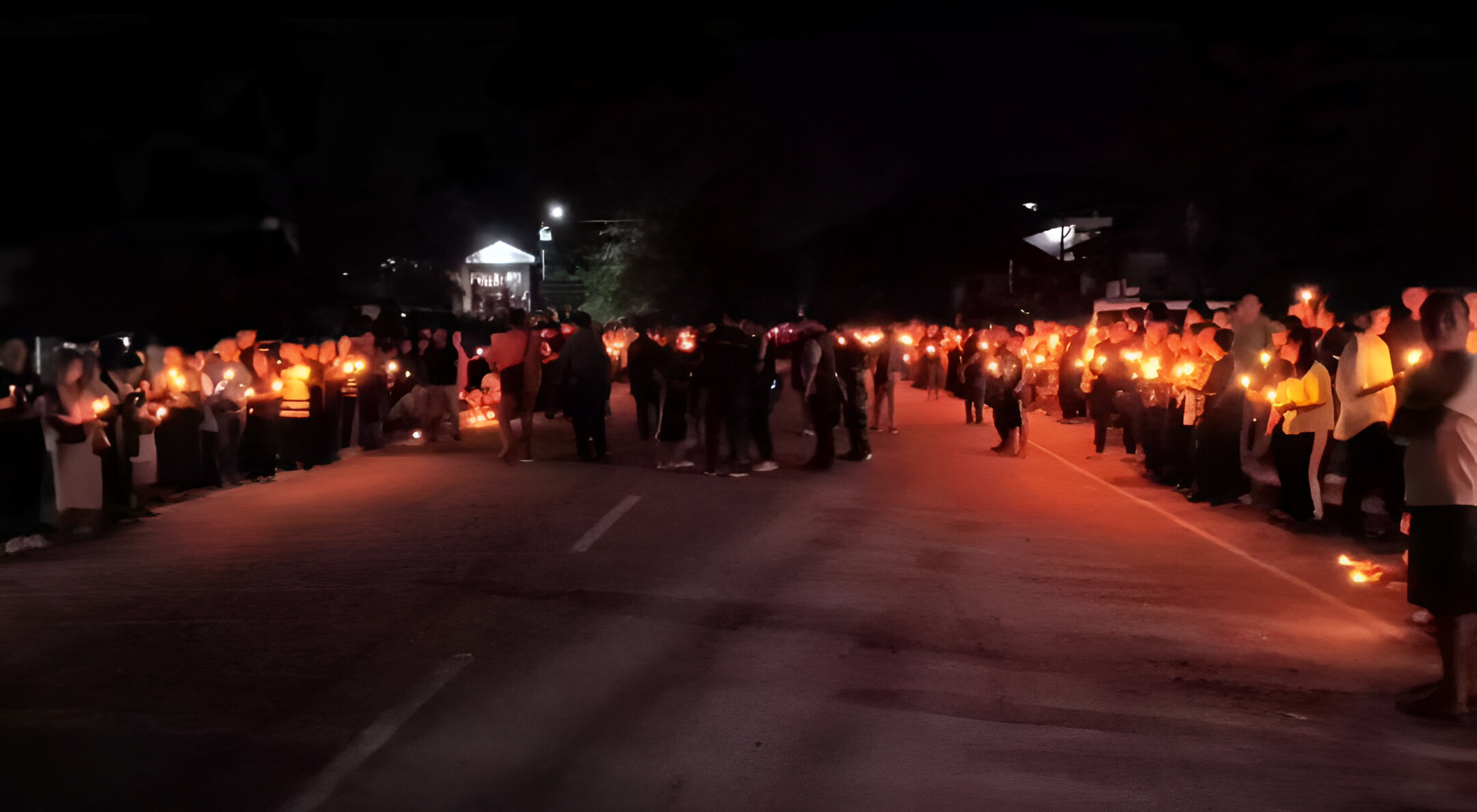Manipur: Kuki-Zo Community Holds Candlelight Vigil to Mourn Kashmir Terror Attack Victims
Quick Summary
In a deeply emotional gesture, the Kuki-Zo community in Manipur came together to hold a candlelight vigil mourning the victims of a recent terror attack in Kashmir. Organized to express solidarity and grief, the vigil highlighted the shared pain of communities facing violence across different parts of India. This peaceful event not only honored the memory of the deceased but also sent a powerful message of unity and resilience.
A Night of Candles, Tears, and Solidarity: Manipur’s Tribute to Kashmir
Have you ever noticed how a simple candle can light up not just a dark space, but also hearts weighed down by sorrow?
That’s exactly what happened in Manipur recently, as members of the Kuki-Zo community gathered, candles in hand, to mourn and honor victims of a terror attack thousands of miles away in Kashmir.
Sounds powerful, right?
Let’s unpack the entire story—and why it matters more than you think.
The Heartbreaking Trigger: Kashmir’s Terror Attack
Terrorism spares no one.
In a chilling incident in Kashmir, several innocent lives were lost to mindless violence. It wasn’t just the region of Kashmir that felt the ripples—hearts across India broke. Communities, even those miles away, felt the pain like a knife twisting in their gut.
The Kuki-Zo community, nestled in the northeastern state of Manipur, felt that pain acutely. After all, when you’ve tasted conflict firsthand, you don’t need to be told how deep those scars run.
Kuki-Zo’s Silent Cry: Why the Vigil Matters
Now, you might wonder—why did a community in Manipur, battling its own turmoil, take time to mourn victims in Kashmir?
The answer is simple: Pain recognizes pain.
The Kuki-Zo people have endured decades of conflict, displacement, and loss. Their history isn’t written in golden ink but in the silent tears of mothers, the broken dreams of youth, and the determination of survivors.
By holding a candlelight vigil, they were saying:
“We see you. We grieve with you. We stand with you.”
It wasn’t just a ceremony—it was an unspoken bond of shared humanity.
The Scene: A River of Light
Imagine this:
Rows and rows of tiny flames, flickering against the dark velvet of night. Faces illuminated by soft glows—some tear-streaked, others stoic but broken inside.
The Kuki-Zo community members, young and old, stood shoulder to shoulder, offering prayers, observing silence, and lighting candles for lives lost to hatred.
It was somber.
It was raw.
It was beautiful.
No fancy speeches. No slogans. Just the quiet defiance of hope in the face of darkness.
Unity in Grief: More Than Just A Regional Issue
One thing this vigil highlighted is that terrorism and violence are not isolated problems.
They’re a national tragedy.
When people from Manipur weep for people from Kashmir, it tears down the imaginary walls that divide us into “us” and “them.” It reminds us that suffering doesn’t wear a specific face or speak a particular language.
Grief? It’s universal.
And sometimes, it’s the only bridge strong enough to carry the weight of both love and loss.
The Power of Candlelight Vigils: More Than Just Symbolism
You might ask—do candlelight vigils really change anything?
Here’s the truth: they might not bring back the dead, or magically erase pain.
But they do matter.
They offer comfort.
They give people an outlet for their emotions.
They create spaces for unity in a fractured world.
It’s like planting seeds in a battlefield—maybe nothing blooms immediately, but someday, somehow, something beautiful might grow.
Kuki-Zo Community: A History of Resilience
Understanding why the Kuki-Zo community took such a strong emotional stand means understanding a bit of their story too.
The Kuki-Zo are no strangers to violence and struggle.
From colonial-era conflicts to modern ethnic tensions in Manipur, they’ve endured waves of hardship. Even today, in the midst of political turmoil and displacement, they cling fiercely to their cultural identity and spirit.
So, when they mourn, it isn’t from a place of detached sympathy—it’s personal.
Manipur’s Message to the Nation: We Are One
Through their candlelight vigil, the Kuki-Zo community sent a clear, powerful message to the entire country:
“Your pain is our pain. Your loss is our loss. And no amount of violence will snuff out our collective humanity.”
In a time when division often grabs headlines, acts like these shine like beacons of hope.
It’s proof that empathy isn’t dead.
It’s alive—in every trembling flame, every whispered prayer, every heart that refuses to grow cold.
The Media’s Role: Shining Light Where It Matters
Let’s be real—good news rarely makes the front page these days.
Violence sells. Tragedy bleeds into headlines.
But stories like this one?
They deserve just as much spotlight.
Because when communities like the Kuki-Zo choose compassion over indifference, they give us all a roadmap for healing.
And isn’t that something worth talking about?
Conclusion: Light in the Darkest Places
The Kuki-Zo community’s candlelight vigil in Manipur isn’t just about mourning—it’s about resistance.
It’s about choosing light over darkness, hope over despair, and unity over division.
In a world that’s often too quick to break, they remind us of the quiet, stubborn power of standing together—even in grief.
So next time you light a candle, remember:
You’re not just pushing back the darkness outside.
You’re also keeping the darkness inside at bay.
FAQs
Q1: Why did the Kuki-Zo community in Manipur hold a vigil for Kashmir terror victims?
They held the vigil as a gesture of solidarity, mourning the loss of innocent lives and showing that violence anywhere is felt everywhere.
Q2: Where did the candlelight vigil take place?
The vigil was held in Manipur, organized by members of the Kuki-Zo community.
Q3: What is the significance of candlelight vigils?
Candlelight vigils symbolize unity, remembrance, and the human spirit’s resilience against tragedy.
Q4: Has the Kuki-Zo community experienced similar struggles?
Yes, the Kuki-Zo people have faced historic and ongoing conflicts in Manipur, making them empathetic to the pain of others facing violence.
Q5: How can such gestures impact the national discourse?
These acts promote empathy, national unity, and remind us that humanity transcends regional or ethnic differences.


